跨文化交际 -中西方关于女性社会地位理论综述
- 格式:pdf
- 大小:319.47 KB
- 文档页数:4
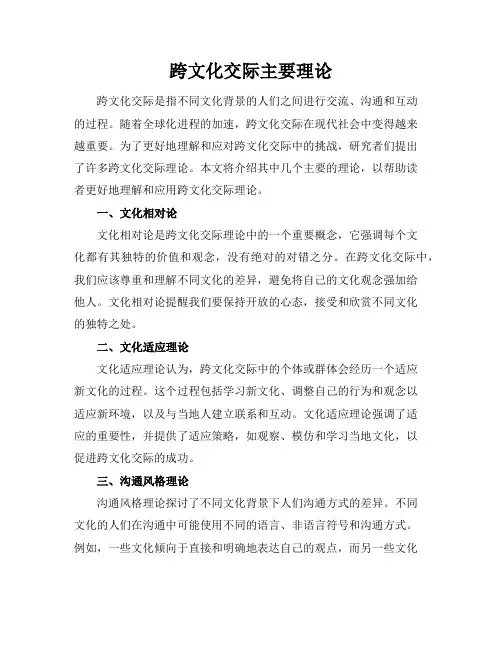
跨文化交际主要理论跨文化交际是指不同文化背景的人们之间进行交流、沟通和互动的过程。
随着全球化进程的加速,跨文化交际在现代社会中变得越来越重要。
为了更好地理解和应对跨文化交际中的挑战,研究者们提出了许多跨文化交际理论。
本文将介绍其中几个主要的理论,以帮助读者更好地理解和应用跨文化交际理论。
一、文化相对论文化相对论是跨文化交际理论中的一个重要概念,它强调每个文化都有其独特的价值和观念,没有绝对的对错之分。
在跨文化交际中,我们应该尊重和理解不同文化的差异,避免将自己的文化观念强加给他人。
文化相对论提醒我们要保持开放的心态,接受和欣赏不同文化的独特之处。
二、文化适应理论文化适应理论认为,跨文化交际中的个体或群体会经历一个适应新文化的过程。
这个过程包括学习新文化、调整自己的行为和观念以适应新环境,以及与当地人建立联系和互动。
文化适应理论强调了适应的重要性,并提供了适应策略,如观察、模仿和学习当地文化,以促进跨文化交际的成功。
三、沟通风格理论沟通风格理论探讨了不同文化背景下人们沟通方式的差异。
不同文化的人们在沟通中可能使用不同的语言、非语言符号和沟通方式。
例如,一些文化倾向于直接和明确地表达自己的观点,而另一些文化则更注重委婉和含蓄的表达。
了解不同文化的沟通风格,有助于我们更好地理解对方的意思,避免误解和冲突。
四、文化智力理论文化智力理论认为,跨文化交际中的成功取决于个体的文化智力水平。
文化智力是指个体对文化差异的意识和理解,以及在不同文化环境中有效沟通和适应的能力。
文化智力包括认知智力、情感智力和行为智力三个方面。
通过培养和提高自己的文化智力,我们可以更好地理解和应对跨文化交际中的挑战。
五、文化冲突理论文化冲突理论探讨了跨文化交际中可能出现的冲突和摩擦。
不同文化的人们在价值观、信仰、行为习惯等方面可能存在差异,这可能导致误解、偏见和冲突。
文化冲突理论提出了冲突解决策略,如建立共同目标、寻求共识、尊重差异和建立信任等,以促进跨文化交际的和谐与成功。
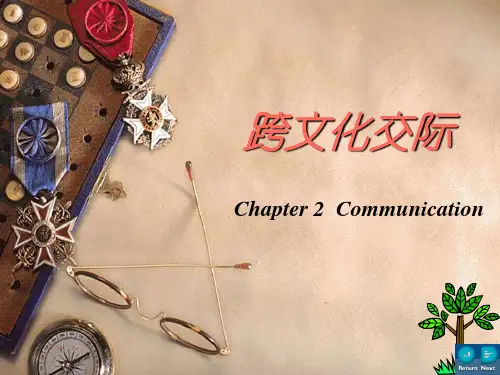
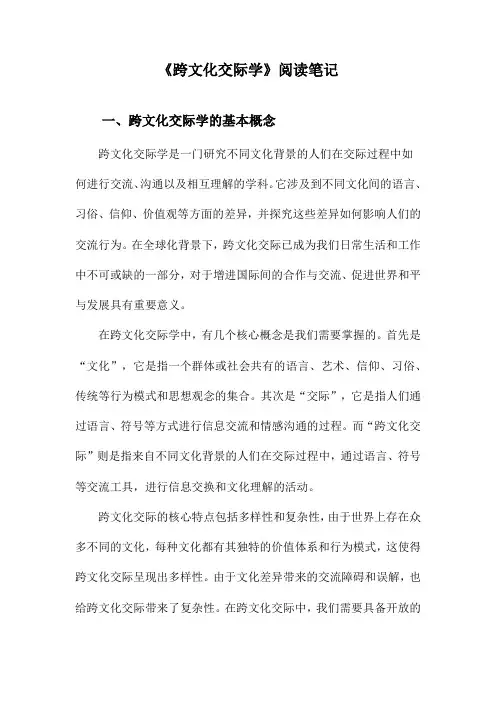
《跨文化交际学》阅读笔记一、跨文化交际学的基本概念跨文化交际学是一门研究不同文化背景的人们在交际过程中如何进行交流、沟通以及相互理解的学科。
它涉及到不同文化间的语言、习俗、信仰、价值观等方面的差异,并探究这些差异如何影响人们的交流行为。
在全球化背景下,跨文化交际已成为我们日常生活和工作中不可或缺的一部分,对于增进国际间的合作与交流、促进世界和平与发展具有重要意义。
在跨文化交际学中,有几个核心概念是我们需要掌握的。
首先是“文化”,它是指一个群体或社会共有的语言、艺术、信仰、习俗、传统等行为模式和思想观念的集合。
其次是“交际”,它是指人们通过语言、符号等方式进行信息交流和情感沟通的过程。
而“跨文化交际”则是指来自不同文化背景的人们在交际过程中,通过语言、符号等交流工具,进行信息交换和文化理解的活动。
跨文化交际的核心特点包括多样性和复杂性,由于世界上存在众多不同的文化,每种文化都有其独特的价值体系和行为模式,这使得跨文化交际呈现出多样性。
由于文化差异带来的交流障碍和误解,也给跨文化交际带来了复杂性。
在跨文化交际中,我们需要具备开放的心态和包容的态度,尊重不同文化之间的差异,学会在交流中调整自己的交流策略,以达到更好的交流效果。
为了更好地进行跨文化交际,我们需要了解不同文化间的差异,包括语言、习俗、信仰、价值观等方面的差异。
这些差异可能导致交际中的误解和冲突,因此我们需要通过学习和实践来提升自己的跨文化交际能力,包括语言交际能力、文化适应能力、跨文化意识等方面。
我们才能在全球化的大背景下更好地适应和融入不同的文化环境,促进国际间的交流与合作。
1. 跨文化交际的定义与内涵跨文化交际学是一门研究不同文化背景的人们之间如何进行有效沟通的学科。
在全球化日益发展的今天,跨文化交际的重要性愈发凸显。
在阅读《跨文化交际学》我对其中的定义与内涵有了更深入的了解。
跨文化交际,指的是不同文化背景的人通过语言、符号等交流工具进行信息、情感、观点等的交换过程。
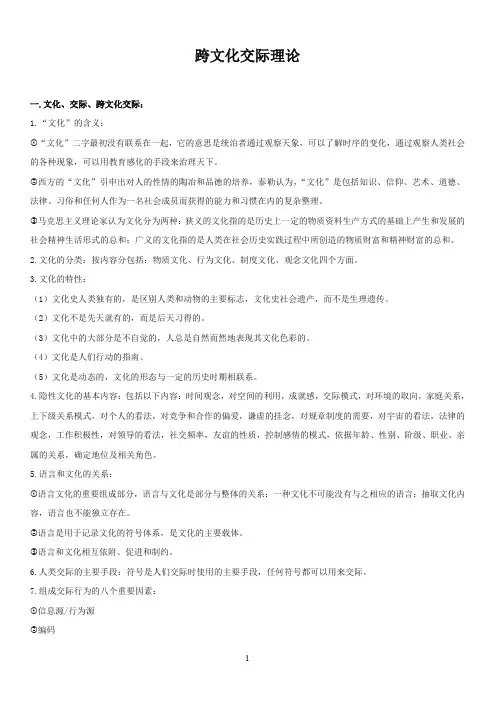
跨文化交际理论一.文化、交际、跨文化交际:1.“文化”的含义:①“文化”二字最初没有联系在一起,它的意思是统治者通过观察天象,可以了解时序的变化,通过观察人类社会的各种现象,可以用教育感化的手段来治理天下。
②西方的“文化”引申出对人的性情的陶冶和品德的培养,泰勒认为,“文化”是包括知识、信仰、艺术、道德、法律、习俗和任何人作为一名社会成员而获得的能力和习惯在内的复杂整理。
③马克思主义理论家认为文化分为两种:狭义的文化指的是历史上一定的物质资料生产方式的基础上产生和发展的社会精神生活形式的总和;广义的文化指的是人类在社会历史实践过程中所创造的物质财富和精神财富的总和。
2.文化的分类:按内容分包括:物质文化、行为文化、制度文化、观念文化四个方面。
3.文化的特性:(1)文化史人类独有的,是区别人类和动物的主要标志,文化史社会遗产,而不是生理遗传。
(2)文化不是先天就有的,而是后天习得的。
(3)文化中的大部分是不自觉的,人总是自然而然地表现其文化色彩的。
(4)文化是人们行动的指南。
(5)文化是动态的,文化的形态与一定的历史时期相联系。
4.隐性文化的基本内容:包括以下内容:时间观念,对空间的利用,成就感,交际模式,对环境的取向,家庭关系,上下级关系模式,对个人的看法,对竞争和合作的偏爱,谦虚的挂念,对规章制度的需要,对宇宙的看法,法律的观念,工作积极性,对领导的看法,社交频率,友谊的性质,控制感情的模式,依据年龄、性别、阶级、职业、亲属的关系,确定地位及相关角色。
5.语言和文化的关系:①语言文化的重要组成部分,语言与文化是部分与整体的关系:一种文化不可能没有与之相应的语言;抽取文化内容,语言也不能独立存在。
②语言是用于记录文化的符号体系,是文化的主要载体。
③语言和文化相互依附、促进和制约。
6.人类交际的主要手段:符号是人们交际时使用的主要手段,任何符号都可以用来交际。
7.组成交际行为的八个重要因素:①信息源/行为源②编码③信息④渠道⑤信息接收者/反应者⑥译码⑦反应⑧反馈8.影响交际的因素:①宽泛的交际环境:包括价值观念,文化取向,宇宙观,社会结构,心理因素,物理环境因素等。
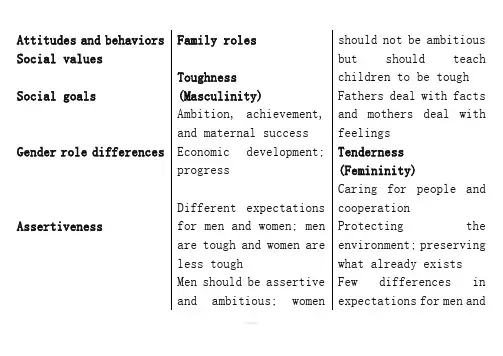
Attitudes and behaviors Social values Social goals Gender role differences Assertiveness Family roles Toughness (Masculinity) Ambition, achievement, and maternal success Economic development; progress Different expectations for men and women; men are tough and women are less tough Men should be assertive and ambitious; womenshould not be ambitiousbut should teach children to be tough Fathers deal with facts and mothers deal with feelings Tenderness (Femininity)Caring for people and cooperation Protecting the environment; preserving what already exists Few differences in expectations for men andwomen; both should be tenderNo one should be too assertive or ambitious; everybody should be modestBoth fathers and mothers deal with facts and feelingsExpectations for children Resolving conflictsManagement styleDecision makingGirls cry; boys don’t;boys should fight backwhen attacked; girlsshouldn’t fightResolve conflicts byshowing strength andfighting them out ifnecessaryManagers should beresourceful, decisiveand assertive; they arevisibleAt meetings individualsshow how good they are;decisions are madeelsewhereBoth boys and girls are allowed to cry but neither should fightResolve conflicts by compromise and negotiationManagers should be resourceful but not visible; they use intuition and strive for consensusAt meetings common problems are discussedand solutions soughtSocial attitudesOpinion leadersReward the strong; bigand fast are beautifulThe top student in class;the most successfulbusinessman。
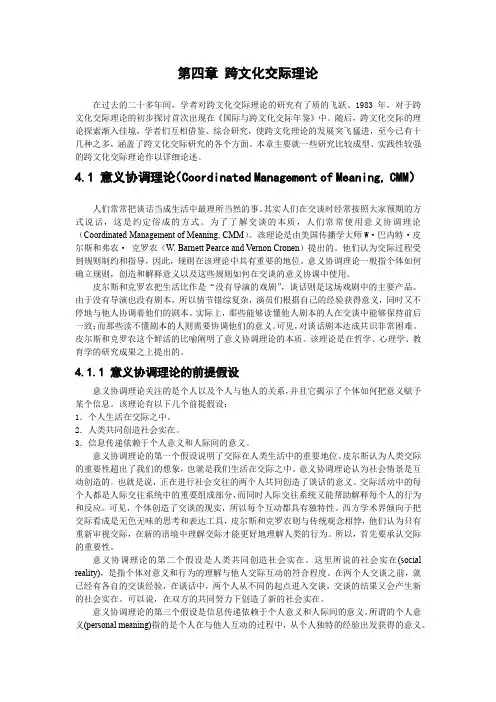
第四章跨文化交际理论在过去的二十多年间,学者对跨文化交际理论的研究有了质的飞跃。
1983年,对于跨文化交际理论的初步探讨首次出现在《国际与跨文化交际年鉴》中。
随后,跨文化交际的理论探索渐入佳境,学者们互相借鉴、综合研究,使跨文化理论的发展突飞猛进,至今已有十几种之多,涵盖了跨文化交际研究的各个方面。
本章主要就一些研究比较成型、实践性较强的跨文化交际理论作以详细论述。
4.1 意义协调理论(Coordinated Management of Meaning, CMM)人们常常把谈话当成生活中最理所当然的事。
其实人们在交谈时经常按照大家预期的方式说话,这是约定俗成的方式。
为了了解交谈的本质,人们常常使用意义协调理论(Coordinated Management of Meaning, CMM)。
该理论是由美国传播学大师W·巴内特·皮尔斯和弗农·克罗农(W. Barnett Pearce and Vernon Cronen)提出的。
他们认为交际过程受到规则制约和指导,因此,规则在该理论中具有重要的地位。
意义协调理论一般指个体如何确立规则,创造和解释意义以及这些规则如何在交谈的意义协调中使用。
皮尔斯和克罗农把生活比作是“没有导演的戏剧”,谈话则是这场戏剧中的主要产品。
由于没有导演也没有剧本,所以情节错综复杂,演员们根据自己的经验获得意义,同时又不停地与他人协调着他们的剧本。
实际上,那些能够读懂他人剧本的人在交谈中能够保持前后一致;而那些读不懂剧本的人则需要协调他们的意义。
可见,对谈话剧本达成共识非常困难。
皮尔斯和克罗农这个鲜活的比喻阐明了意义协调理论的本质。
该理论是在哲学、心理学、教育学的研究成果之上提出的。
4.1.1 意义协调理论的前提假设意义协调理论关注的是个人以及个人与他人的关系,并且它揭示了个体如何把意义赋予某个信息。
该理论有以下几个前提假设:1.个人生活在交际之中。
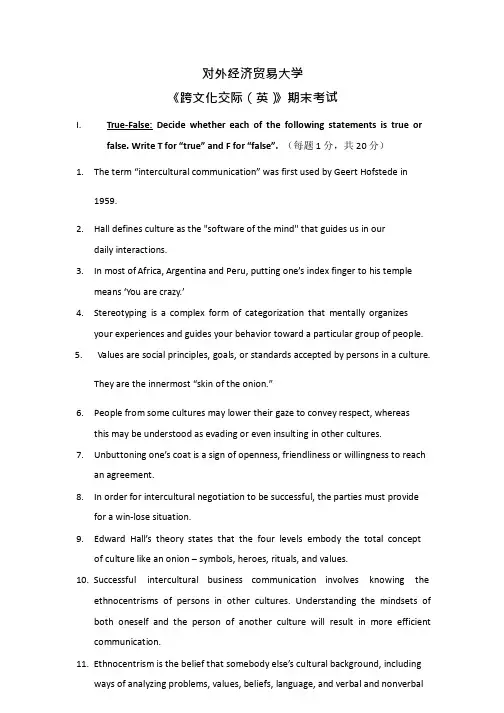
对外经济贸易大学《跨文化交际(英)》期末考试I. True-False: Decide whether each of the following statements is true orfalse. Write T for “true” and F for “false”. (每题 1 分,共 20 分)1. The term “intercultural communication” was first used by Geert Hofstede in1959.2. Hall defines culture as the "software of the mind" that guides us in ourdaily interactions.3. In most of Africa, Argentina and Peru, putting one’s index finger to his templemeans ‘You are crazy.’4. Stereotyping is a complex form of categorization that mentally organizesyour experiences and guides your behavior toward a particular group of people.5. Values are social principles, goals, or standards accepted by persons in a culture.They are the innermost “skin of the onion.”6. People from some cultures may lower their gaze to convey respect, whereasthis may be understood as evading or even insulting in other cultures.7. Unbuttoning one’s coat is a sign of openness, friendliness or willingness to reachan agreement.8. In order for intercultural negotiation to be successful, the parties must providefor a win-lose situation.9. Edward Hall’s theory states that the four levels embody the total conceptof culture like an onion – symbols, heroes, rituals, and values.10. Successful intercultural business communication involves knowing theethnocentrisms of persons in other cultures. Understanding the mindsets of both oneself and the person of another culture will result in more efficient communication.11. Ethnocentrism is the belief that somebody else’s cultural background, includingways of analyzing problems, values, beliefs, language, and verbal and nonverbalcommunication, is better than our own.12. People in the United States place a greater emphasis on history and do notlike change as compared with people of Asian and Latin cultures.13. When dealing with German business people, you should avoid jokes andother forms of humor during the actual business sessions.14. In the business circle, American business people use first names immediately.15. Companies should avoid sending female employees to the Middle East, as inArab countries men may refuse to work with women.16. In Southeast Asia, you should avoid presenting your business card with your righthand.17. When accepting a business card, German business people carefully look at thecard, observe the title and organization, acknowledge with a nod that theyhave digested the information, and perhaps make a relevant comment or aska polite question.18. The OK sign may be interpreted as asking for money by Japanese businesspeople.19. Nonverbal communication is important to the study of interculturalcommunication because a great deal of nonverbal behavior speaks auniversal language.20. In short, intercultural communication competence requires sufficientawareness knowledge, motivations, and skills. Each of these components alone is sufficient to achieve intercultural communication competence.II. Translation: Translate the following Chinese terms into English and English terms into Chinese.(每题 1 分,共 20 分)1. stereotypes2. paralanguage3. ethnocentrism4. masculinity5. high-context culture6. monochronic time7. speech act 8. conversation taboos9. vocal qualifiers 10. power distance11. 译码12.偏见13. 文化震惊14.不确定性回避15. 概念意义16.语用错误17. 礼貌原则18.归纳法19. 空间语言20.礼仪与礼节III. Multiple Choice: Choose the ONE appropriate answer. (每题 1 分,共20 分)1. Understanding another culture .a. enables businesspeople to know why foreign associates believe andact as they dob. is best achieved through “do’s and don’ts” listsc. is important for businesspeople because they can appear to bebetter informedd. isn’t necessary for businesspeople2. Non-linear languages .a. are object orientedb. see time as a continuum of present, past andfuture c. are circular, tradition oriented andsubjectived. lead to short-range planning in business practices3. Which statement about values is incorrecta. Values are social principles, goals, or standards accepted by persons ina culture.b. Values are learned by contacts with family members, teachers,and religious leaders.c. Values will be influenced by what is seen on television or read innewspapers.d. People in various cultures have basically similar values.4. People from cultures that follow the monochronic time system tendto a. do one thing at a time.b. be committed to people.c. borrow and lend things often.d. build lifetime relationships.5. Which statement regarding haptics is incorrecta. In Thailand, it is offensive to touch the head.b. Japan is considered a "don't touch" culture.c. Greece is considered a "touch" culture.d. In Latin American countries, touching between men is unacceptable.6. The opinion that everyone has a position and clearly defined privileges is .a. a view of hierarchical structure of social relationshipb. a view of group orientation structure of social relationshipc. a view of individual orientation structure of social relationshipd. none of the above7. General guidelines to follow when conversing with someone fromanother culture include all of the following except:a. politics is a safe topic in most cultures.b. avoid telling jokes.c. avoid personal questions.d. keep the conversation positive.8. Which statement best describes an incorrect handshakea. In the ., a handshake should be firm.b.An Asian handshake is usually gentle.c. Germans repeat a brusque handshake upon arrival anddeparture. d. A British handshake is firm and repeated frequently.9. Which statement referring to thought patterns is incorrecta. Asians typically use the inductive method of reasoning.b. Thought patterns impact oral communication.c. When using the deductive method of reasoning, one starts with thefacts and goes to generalizations.d. Recognizing different thought patterns is important in negotiation withdifferent cultures.10. Which statement is incorrecta. Costly business blunders are often the result of a lack of knowledgeof another culture's nonverbal communication patterns.b. Processes of reasoning and problem solving are the same in all cultures.c. Attitudes toward time and use of space convey nonverbal messagesin intercultural encounters.d. When in another culture, an appropriate caution would be to watchthe behavior of the persons you are talking with and match their style.11. Language is important because ita. helps us shape concepts, controls how we think, and controls howwe perceive others.b. allows us to be understood by foreigners.c. is determined by colonialism.d. is stable, easily understood, and free of diversity.12. Which of the following countries uses high-context languagea. Canadab. Germanyc. Japand. United States13. Slang is generallya. understood by everyone.b. spoken by the masses.c. easily translated.d. used by subgroups.14. Nonverbal communication does not includea. chromatics.b. chronemics.c. haptics.d. semantics.15. Dominance, harmony, and subjugation are all value orientations that correspond to which of the following cultural problemsa. What is the nature of human beingsb. What is the relationship of humans to naturec. What is the orientation of humans to timed. What is the human orientation to activity16. Proverbs are significant to the study of intercultural communicationbecause .a. they provide a compact description of a culture’s valuesb. they tell a great deal about what a culture praises and what itrejects c. they unite a people with the wisdom of their ancestorsd. all of the above17. Which statement highlights weak uncertainty avoidancea. One group's truth should not be imposed onothers. b. Scientific opponents cannot be personalfriends.c. Citizen protest should be repressed.d. Negative attitudes are expressed toward young people.18. The main idea of the Sapir-Whorf Hypothesis is thata. language is just a device for reporting a person's experience.b. two languages can represent the same social reality.c. the social reality can be conveyed to a person who does not speakthe language.d. language functions as a way of shaping a person's experience.19. Many multinational firms find that cultural shock can be alleviated bya. sending only top executives abroad.b. sending only young, single associates on overseas assignments.c. testing associates to see who is most qualified.d. selecting employees for overseas assignments who possesscertain personal and professional qualifications.20. Which of the following statement is incorrecta. Knowing cultural variations in the use of silence is helpful whenconversing with persons in another culture.b. We need to keep things in perspective and not get offended each timewe deal with someone who has a different attitude toward touchingc. Good advice when communicating with persons in other cultures isto keep gestures to a minimumd. Although oral communication varies from culture to culture, non-verbal communication is almost always interpreted the same in eachculture.IV. Answer the following essay question. (共 20 分)Compare and contrast the following proverbs from two different cultures: “It is the duck that squawks that gets shot” and “The squeaky wheel gets the grease.”How do people from these cultures perceive silence and talk In light of their different perceptions, how might they view each other What problems might arise in their interactionsV. Case Analysis: Analyze the following conversation from an intercultural perspective. (共 20 分)The following conversation took place between two Chinese friends.A: We’re going to New Orleans this weekend.B: What fun! I wish we were going with you. How long are you going to be thereA: Three days.B: Do you need a ride to the airport I’ll take you.A: Are you sure it’s not too much troubleB: No, no. It’s no trouble at all.Case Analysis: Analyze the following conversation f rom an intercultural perspective.参考答案及评分标准A 卷VI. True-False: Decide whether each of the following statements is true or false. Write T for “true” a nd F for “false”. (每题 1 分,共 20 分)1. F2. F3. F4. T5. T6. T7. T8. F9. F 10. T11. F 12. F 13. T 15. T 16. F 17. F 18. T 19. T 20. FVII.Translation: Translate the following Chinese terms into English and English terms into Chinese.(每题 1 分,共20 分)1. stereotypes 定势/刻板印象2. paralanguage 辅助语言/副语言3. ethnocentrism 民族中心主义4. masculinity 男性特征5. high-context culture 高语境文化6. m onochronic t ime 单一时间观念7. speech act 言语行为8. conversation taboos 对话禁忌9. vocal qualifiers 声音修饰10. power distance 权力距离11. 译码 decoding 12. 偏见prejudice13. 文化震惊 cultural shock 14. 不确定性回避uncertaintyavoidance15. 概念意义 denotational meaning 16. 语用错误 pragmatic f ailure17. 礼貌原则 the Politeness Principle 18. 归纳法inductivepattern19. 空间语言 spatial language/proximics 20. 礼仪与礼节etiquette andprotocolVIII. Multiple Choice: Choose the ONE appropriate answer. (每题 1 分,共 20 分)1. a2. a3. d4. a5. d6. a7. a8. d9. c 10. b11. a 12. c 13. d 14. d 15. b 16. d 17. a 18. d 19. d 20. d IX. Answer the following essay question. (共 20 分)测试重点: Compare and contrast the proverbs “It is the duck that squawks that gets shot”and “The squeaky wheel gets the grease.”The former is an English proverbwhile the latter is a Chinese proverb. In light of their different perceptions, the two cultures might differ in terms of silence and talk etc. and problems might arise in their interactions.评分标准:从以上角度进行分析,其他根据具体答题情况酌情。
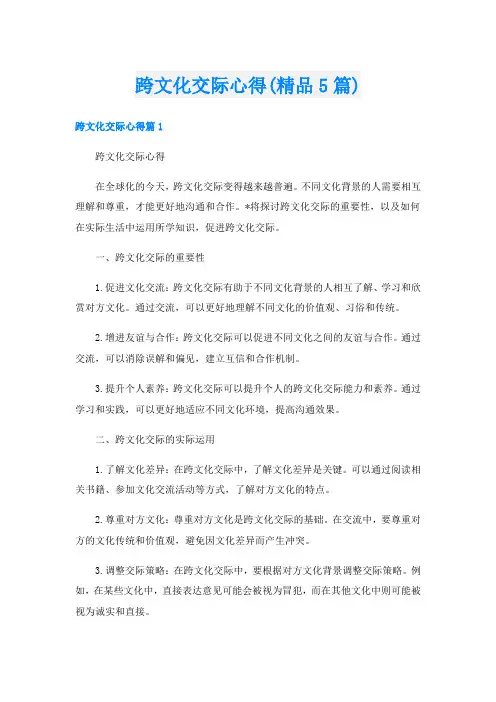
跨文化交际心得(精品5篇)跨文化交际心得篇1跨文化交际心得在全球化的今天,跨文化交际变得越来越普遍。
不同文化背景的人需要相互理解和尊重,才能更好地沟通和合作。
*将探讨跨文化交际的重要性,以及如何在实际生活中运用所学知识,促进跨文化交际。
一、跨文化交际的重要性1.促进文化交流:跨文化交际有助于不同文化背景的人相互了解、学习和欣赏对方文化。
通过交流,可以更好地理解不同文化的价值观、习俗和传统。
2.增进友谊与合作:跨文化交际可以促进不同文化之间的友谊与合作。
通过交流,可以消除误解和偏见,建立互信和合作机制。
3.提升个人素养:跨文化交际可以提升个人的跨文化交际能力和素养。
通过学习和实践,可以更好地适应不同文化环境,提高沟通效果。
二、跨文化交际的实际运用1.了解文化差异:在跨文化交际中,了解文化差异是关键。
可以通过阅读相关书籍、参加文化交流活动等方式,了解对方文化的特点。
2.尊重对方文化:尊重对方文化是跨文化交际的基础。
在交流中,要尊重对方的文化传统和价值观,避免因文化差异而产生冲突。
3.调整交际策略:在跨文化交际中,要根据对方文化背景调整交际策略。
例如,在某些文化中,直接表达意见可能会被视为冒犯,而在其他文化中则可能被视为诚实和直接。
4.练习口语表达:在跨文化交际中,口语表达是关键。
要积极练习口语表达,提高口语能力,以便更好地与不同文化背景的人交流。
总之,跨文化交际是全球化时代的必然趋势。
要积极学习跨文化交际知识,并在实际生活中运用所学知识,促进跨文化交际。
跨文化交际心得篇2跨文化交际是一种涉及不同文化背景的交际活动,需要参与者具备跨文化知识和交际技巧。
近年来,随着全球化的不断发展,跨文化交际变得越来越普遍,也越来越重要。
*将探讨跨文化交际的重要性、过程和收获,并反思自己在跨文化交际中的问题和不足。
跨文化交际的重要性在于,不同文化之间的差异可能导致误解和冲突。
通过跨文化交际,我们可以更好地了解和尊重不同文化背景的人,促进文化交流和理解。

Case 1 Girl-nessAs a visiting professor in an American university, Zhang Hua was invited to give a lecture to a group of American students. He talked about university students in China. During the question-and-answer period after the lecture, one female s tudent asked a question that surprised Zhang Hua. “When you talked about female students, you referred to them as girls. Why?”“Because they are girls. That‟s what they are called,” Zhang Hua tried to answer, but he knew he did not really understand the in tent of the question. “ I don‟t quite understand your question, I‟m afraid.”“In the States, we call ourselves … women‟ if we‟re old enough to go to the university. Calling us …girls‟ is insulting.”Do Chinese female college students prefer to be called women?Case 2Many years ago, a Chinese man showed a photo of his wife to some American visitors. Out of courtesy, they all said,” She is very beautiful.” Also out of courtesy, the man replied with what he would have done in Chinese under the circumstance,” Where! Where!” Quite taken aback, nobody said anything for a moment, until the most ingenious one among the visitors, taking another look at the photo, said, “Oh, everywhere!”What did the Chinese intend to mean by replying with “ Where! Where!”?Case 1 Girl-nessAs a visiting professor in an American university, Zhang Hua was invited to give a lecture to a group of American students. He talked about university students in China. During the question-and-answer period after the lecture, one female student asked a question that surprised Zhang Hua. “When you talked about female students, you referredto them as girls. Why?”“Because they are girls. That‟s what they are called,” Zhang Hua tried to answer, but he knew he did not really understand the intent of the question. “ I don‟t quite understand your question, I‟m afraid.”“In the States, we call ourselves … women‟ if we‟re old enough to go to the university. Calling us …girls‟ is insulting.”Do Chinese female college students prefer to be called women?Case 2Many years ago, a Chinese man showed a photo of his wife to some American visitors. Out of courtesy, they all said,” She is very beautiful.” Also out of courtesy, the man replied with what he would have done in Chinese under the circumstance,” Where! Where!” Quite taken aback, nobody said anything for a moment, until the most ingenious one among the visitors, taking another look at the photo, said, “Oh, everywhere!”What did the Chinese intend to mean by replying with “ Where! Where!”?Case 3 “I Just Wanted to Talk”.Wu tong was a graduate student in a Chinese university. Like many students these days, he was very keen on learning English. He would talk with English speakers as often as he could.One day, he saw a new foreigner on campus, Leonard Ramsay, and overheard him speaking English. When Mr. Ramsay finished speaking with the other person, he turned to go, but Wu Tong stopped him. He went up and said, “ You speak English, is that right?”“Yes, why?”“I‟d like to practise my English with you, if you don‟t mind.”Mr. Ramsay looked a little annoyed. “ I prefer not to, if you don‟t mind.”Case 4 An Unwanted Food ServiceDuring a lunch buffet at a conference in China, Wu Fa, the interpreter of the conference, sat with four foreign participants. They were having a good time talking. When Wu Fa stood up for more food, she asked whether she could bring anything back for them.Everyone thanked her and said “no”. A while later, Wu Fa came back with a plate full of food, and asked whether the others would like to have something from her plate.Again, the four others said , “No”.“ Oh, please take something, I can‟t eat this much food myself.”The foreigners shrugged and one or two of them even frowned a little.Case 5 Simple Can Be SpecialWen Hong had an American professor in her economics class in China. She had given the professor a lot of help during the course. At the end of the semester,the professor and his wife invited her to their home for dinner. They said they were going to cook her an American meal.Wen Hong felt very flattered and excited,since McDonald,KFC and Pizza Hut had been her only exposure to Western cooking.They had salad to start with,then steak with potatoes,followed by ice cream. Wen Hong had expected more courses but the meal came to an end. She knew the professor and his wife were being kind to her,but somehow she was a little disappointed. She wondered whether Americans do eat like that at home.Case 6 Chinese Coffee CustomsWhile studying in the United States, Lin Jun made a few American friends. One day he invited two of them to his apartment and cooked them a meal. When his friends said they would like some coffee, he started boiling some water. Without asking them any questions, he made three cups of 3-in-1 coffee, the way he usually took it.Both friends tasted the coffee and frowned. One said she always took coffee black,the other said he preferred to have less sugar in his coffee. They also told him that the spoon is for stirring the coffee,not to drink from like he did. LinJun was embarrassed. He had thought that everyone drank coffee the same way as he did.Case 7 Noise from NoodlesJane and Peter were Chen Dong‟s landlord and landlady when he was in the States. They had become good friends by the end of his one-year stay. They kept in touch with each other after Chen Dong returned to China. Jane and Peter decided to visit China soon after Chen Dong left the States.They made a special stop in Guangzhou where Chen Dong lives. Chen Dong had promised to show them around the city and let them try some authentic Cantonese food. One thing,in particular,he wanted them to try was noodles. He knew several restaurants that served good noodles and took the couple to one of them for lunch one day.Noodles typically come in soup in Cantonese cooking. Chen Dong started eating the noodles with chopsticks,while Jane and Peter exchanged a look at the noise that came with his eating. After a little hesitation,they asked for forks. A waitress told them that they did not have forks,and Chen Dong explained that noodle restaurants do not usually keep forks because no one would think of using forks for noodles.In the next half an hour,Jane and Peter had a hard time trying to roll the long noodles onto their chopsticks. Chen Dong said,“that‟s not the way we eat noodles. You put the noodles directly to y our mouth with your chopsticks.”“But that‟s not the way we eat noodles,” Jane and Peter said, frowning. Case 8 Dinner in a Chinese HomeBesides taking Peter and Jane to restaurants, Dong Chen also invited them to his home for dinner once. Dong C hen …s mother is a nice wife, and made eight courses for four of them.“I'm sorry there isn‟t much for dinner, she said.”“God this is much more than enough food,” Jane said. Peter was too overwhelmed to even respond to Dong Chen… motherDong Chen was a li ttle embarrassed. “This is what we usually say to guests,even though there‟s plenty of food” he explained.What bewildered Jane and Peter most was that though Dong Chen‟s mother kept saying that the food was not good,she constantly served helpings to Jane and Peter.Peter did not like two of the courses very much,and felt bad that his plate was full with whatever he would not be able to eat. At seeing Dong Chen's mother‟s next move to serve him food,he said in a begging voice,“Please don‟t give me any more food.Let me do it myself.Case 9A Not-sociable DrinkMartin was sent by an American company to work in a special economic development zone in China for a year. He became very friendly with a few Chinese colleagues. Soon, he started to go out with them. He noticed that Chinese like to have something , such as peanuts, when they have beer, instead of just drinking beer without anything to eat as many North Americans do.One day he was invited to a dinner party to celebrate a colleague‟s birthday. They ordered alcoholic beverages and toasted the guest of honor frequently. Soon Martin realized that the plan was to get their friend drunk. Each colleague would offer a toast, concluding with a cheery “ gan bei!” and tried to get Martin to join in, even though he was unwilling to do it. Martin didn‟t think it a good idea, and tried to talk them out of the game. However, he was accused of not being a good friend for not co-operating.Martin remained an outsider during the rest of the dinner. He was getting increasingly worried as he watched the poor guest become increasingly inebriated.Case 10 A Misunderstanding at a Dinner TableRoger was a student majoring in East Asia Studies in an American university. He started an e-mail correspondence with Zhang Li, a sociology major in China, who was introduced to him through a mutual friend.Upon graduation, Roger got a big gift from his grandfather. Grandpa would pay for a round-trip ticket to China. He told Zhang Li the good news, and the two decided to meet.Zhang Li decided to give Roger a very special welcome: she and the three women students in her dormitory would cook him an authentic Chinese meal, as Roger had told her that he loved Chinese food.However, when Roger was presented the dinner, he was almost terrified by some of the food: pork stomach soup, pig liver with ginger and spring onion, chicken with mushrooms in which the chicken had been cut to pieces with bones attached to the meal.Fortunately , there were courses like tofu, stirred fried beef, steamed fish and vegetables that Roger loved. He tried to stick to them but Zhang Li kept putting food he did not like on his plate. When she asked how he liked the liver, Roger said, “ It‟s very unusual…and interesting. “ This seemed to make Zhang Li happy. And she gave him more liver. Roger tried to stop her, but she would not be stopped. Roger was so frustrated that he told her that he did not really like it that much. “ But you said it was unusual and interesting!”Zhang Li said. “ Well,they both mean something less than positive,” Roger said carefully, trying not to hurt their feelings.Zhang Li and her friends became concerned at this.”“So you don‟t like the food?” I‟m not used to eating liver, that‟s all. But I do like the chicken, the beef, the tofu, and the vegetables. I have had more than enough to eat. I never make this much food at home,” Roger was eager to let them know how much he appreciated their effort. “Trust me, I‟m enjoying the food. I know what I like.”Having said that, he found a piece of chicken that was less bony, held it in his hand to eat it, and then licked his fingers. Zhang Li and her friends looked at each other in shock.It was not a perfect first meeting for either Zhang Li or Roger.Case 11 Over-dressed TouristsAs a van stopped in front of Niagara Falls, a group of Chinese officials streamed out. They were dressed in suits and ties, wearing leather shoes. Many of the men also had left the manufacture‟s tag on the sleeve of their suit jacket. As they wandered around Niagara Falls, some of them started to smoke. Their attire drew the stares of North American tourists, some of whom quietly laughed with their friends and pointed at the Chinese visitors. Others frowned at seeing the smoking and shook their heads in disapproval.Case 12 Tie CultureJane was a tourist and spent some time staying with a Chinese friend at her home. They watched a children‟s porgram while having breakfast one morning.A young man, the host of the program, gave instructions of a game to a few children, and then joined them running in a circle.“My, he‟s wearing a tie and running crazy with the children!” Jane exclaimed.The Chinese friend shrugged,”Is this very unusual?”Case 13 An American in ChinaProfessor Smith and his assistant,Chen Ming,were doing fieldwork in a small city in China. It was hot and humid, and both were casually dressed. One evening as they were leaving for dinner,a local administrator told them that the mayor of the city, who was interested in the type of research they were doing, would like to say hello to Professor Smith. As luck would have it,the Mayor was dining in the same restaurant as Smith and Chen Ming.Professor Smith said he had to go back to his room to change.“You look fine,Come on,the mayor is waiting,”the administrator said.“No, I can‟t meet the mayor in my shorts”Case 14 The Generosity of a Chinese StudentMatt was invited to a Chinese university to give a few lectures. During his short stay there, a graduate student volunteered to show him around the city. Matt accepted the offer gratefully. It was summer and soon both Matt and the graduate student began to get quite hot. While Matt took some pictures, the graduate student went to buy some drinks.“Thank you. How much do I owe you?” Matt asked.“Nothing.” The student smiled.“ Are you sure?”“Yes.”At lunchtime, Matt suggested they have a quick meal. They stopped by a McDonald. Again, the graduate student tried to pay for Matt.“No, this is my treat. You‟re a student, I‟m a professor. You‟ve given me the time to show me around. You already paid for my drink. I can‟t let you pay for my lunch again.”Case 15 A Gift from a Chinese StudentXie Dong did his graduate study in an American university. He came back to China for summer vacation. When he went back to his program, he paid his supervisor a visit and presented him a gift.The professor opened the gift. It was a ginseng with its many tiny roots spreading out in a very artistic pattern. It clearly was an expensive gift.The professor‟s eyes shone at the ginseng, but he then began to feel uneasy. “Xie Dong, I appreciate your kindness, but I can‟t take this as a gift.”“ Why? Don‟t you like it?” It was Xie Dong‟s turn to be uneasy now.“ Oh, sure, I love it. But I can‟t accept it.”“Why?”“ Because I didn‟t do anything to deserve such a gift.”Case 16 Telephone CourtesyKathy and David, a couple from the US, signed a one-year contract to work in China. Both were extroverted and soon made some Chinese friends.Before long, people started calling them at home. David was sometimes away on business trips for a few days, and if someone looked for him, Kathy often would find the conversation awkward.“ Where did he go?” The caller typically would ask.“Can I pass on any message?” Kathy asked politely, trying to avoid the question.“Is he out of town?” The caller was usually very persistent.“Yes, can I help you in any way?” Kathy tried to be polite, but she could not help feeling uncomfortable.Case 17 “Not So Close, Please”He Jia had lived in the United States for 7 years before she came back to work in China. She found that she had become accustomed to social habits in North America and that some Chinese behaviours now caused her some discomfort. For example, one day, back in China, she was in a queue to use an ATM. She had noticed that people were standing very close to each other. In fact, the person behind her could, if she or he wanted, to see her enter the PIN of her ATM card. He Jia wanted to make people aware of the discomfort of the user by keeping her distance from the person in front of her. However, the people behind her pushed her to move forward.Case 18 The Privacy of the PageSimon and Cheng Feng often studied together to prepare for exams. One day, in the middle of a study session, Simon said he wanted to get a coffee. He asked Cheng Feng if he wanted any, but he said, “No”. When he came back, he found Cheng Feng reading his notes. He was upset and, although he didn‟t say anything at the time, he never studied with Cheng Feng again. Cheng Feng noticed the change and wondered what had happened.Case19 The Privacy of PhotographsRose invited Lili to her home one day. While they were having coffee, Rose showed Lili a few pictures of her boyfriend in a photo album. Lili casually turned to other pages after that.Rose stopped her, “I‟d rather you not look at other pictures.”Lili was embarrassed, and apologized, “I‟m sorry.”Case 20 The Privacy of PriceAfter living in the States for some time, Ping Li observed that Americans like to comment on each other‟s looks and clothes. So whe n she saw a fellow graduate student wearing a nice dress at a party, she complimented her by saying. “This is a very beautiful dress.” “Oh thank you , I bought it last year before Christmas ,” the student very pleased. “How much was it?” Ping Li asked.“Well I don‟t quite remember,” the student seemed unprepared for thequestion, and answered a little hesitatingly.Case 21 The Privacy of the PersonZou Qing and Nancy became friends after they met in a course they both took.Nancy had had gray hair much earlier than people of the same age,and had been dyeing her hair for several years.While they were having a break one day in between two classes, and Zou Qing noticed that Nancy had some invisible gray hair on her. She told her so, but Nancy changed the topic right away.When everyone else left,Nancy said to Zou Qing,“Please don‟t mention my gray hair while there were men around.”Case 22 Unacceptable CuriosityMr and Mrs Peterson came to China with a tour group. One evening, they decided to take a walk outside their hotel. They soon noticed that quite a few people stared at them. One man even quickly walked past them and then turned back to look at them several times. Both Mr and Mrs Peterson feltuncomfortable about the staring and went back to the hotel sooner than they had planned.Case 23 Confusion in Communicating LoveLe, a Chinese woman, and Bill, an American man, were very much in love. Their relationship started with their shared interest in photography. As time went on, however, Le became dependent on Bill whenever she wanted to take a picture, because she felt that Bill was a much better photographer than she was. Whenever she noticed a scene that would make a good image, she would ask Bill to take the picture for her.Bill was not very pleased but did not say anything for a while. However, Le soon got to a point where she began to ask Bill to load and unload the film. Bill decided that it was too much for him to bear. He exploded, “What‟s the matter with you? Don‟t you know how to load and unload a film? Can‟t you take a picture any more?”Le was so shocked that she burst into tears. “I ask you to do things only because you do it better than me. What‟s wrong with that?”Case24 Unwanted AttentionTeresa is a Chinese American teaching English temporarily at a Chinese university. She is very easy going, and soon the students got to know her well enough to invite her out regularly.Crossing the very busy and wide streets in the city was a scary experience for Teresa, and she complained of it repeatedly. As a result, the female students began to try to help her by taking her hand or grasping her arm while the male students seemed to be shy about protecting her.Teresa was uncomfortable with her female students touching her, and told the women they did not need to do it. Her female students thought she was beingpolite and continued to take care of her the same way. Teresa became so uncomfortable that she tried to move away from her female students whenever they had to cross the road.Case 25 Holding HandsChris was a visiting professor in China. On one day, one of his students, Sun Hui, showed him around the city. Sun Hui soon noticed that Chris was interested in taking pictures of men that were walking arm-in-arm or touching each other when they talked.“ I don‟t see anything special about those men,” Sun Hui said curiously.“ Well, we don‟t see much of that in men in the States,” Chris said, “ They‟re gay, aren‟t they?”Case 26 Friendship MisunderstoodYan Hong was a Chinese painter who immigrated to the United States. She met Jenny, an American physician in a club one day. They soon became friends, and sometimes went out for coffee and lunch together.One day, Jenny gave Yan Hong a very beautiful vase. Yan Hong loved the vase very much, and felt she should give Jenny something in return. So she gave Jenny a painting she brought from China. Jenny was very pleased.A few days later, Jenny invited Yan Hong to her home for the first time. They made dinner together and enjoyed the meal a lot. Then they sat down to watch TV. When Jenny tentatively held Yan Hong‟s hand, Yan Hong was not aware of anything unusual. However, when Jenny sat closer to her and kissed her, Yan Hong was terrified. She pushed Jenny away and cried, “ I‟m not alesb ian!”Jenny was in shock, and asked accusingly, “ Then why didn‟t you tell me earlier?”Case 27 Learning about FlirtingChen Qing was a visiting scholar in an American university. He had made some friends with professors and students there. One day he went to a party where the atmosphere became less and less inhibited. Chen Qing noticed that men and women touched each other a lot more than he was used to. At the end of the party, most people hugged each other good-bye. One woman came to hug Chen Qing, but he stiffened as she attempted to give him a hug. He had never hugged any women except his wife in his life. Other women noticed this, and no one else tried to hug him.However, Chen Qing felt left out when people hugged each other but not him. He foun d himself in a very awkward situation: he didn‟t want to be hugged, neither did he want to be left out. He did not know what he wanted or how to resolve his conflicting emotions.Case28 Lost in LoveLi Ying fell in love with an American man in her second year in the United States. They spent a lot of time together. After they had been to all the places of interest in the city, they had to decide where to go or what to do for the next date. John typically would ask Li Ying, “ What do you want to do today?” , or“ Where shall we go?” Li Ying would sometimes tell what she wanted, but more often than not, she would say “It‟s up to you”, or “ Whatever you want to do”, or “ Wherever you want to go.”John frowned at such responses several times until one day when Li Ying said “ up to you” again. “For God‟s sake, tell me what you want to do!” He cried out loud.Li Ying was shocked at his reaction. “ Isn‟t it clear to you? I‟ll do what you want to do.”“ No, it isn‟t clear at all. I want to know what you want to do!” John was almost angry. “ Don‟t you realize that sometimes I want to do what you want to do, too?”Case 29 Lovers Become StrangersXiao Xin and Peter are newly-weds. Though they spent a lot of time with each other before getting married, they never really lived together. Not surprisingly, their marriage was followed by a series of minor problems while they tried to adjust to each other‟s ways of life. One difficult issue came up about two months after their new life, when Peter came home from work looking unhappy.“ What happened?” Xiao Xin asked.“Nothing much, I‟m just very tired,” Peter said.“I can tell that it‟s more than that.”Peter gave Xiao Xin a quiet look, went into the bedroom, and threw himself to bed.Xiao Xin followed him in. “Don‟t you want to talk about it?”“No, I don‟t.”“Perhaps I can help?” Xiao Xin suggested.“ Xiao Xin, sometimes you just have to give me some space. All I need now is some privacy!” Peter yelled.Xiao Xin was in shock. “Don‟t you trust me?”“Geez, it‟s not a matter of trust! Can‟t you accept the fact that talking to youisn‟t the solution to every one of my problems?” Peter was becoming frustrated and impatient.Xiao Xin was in tears. Her husband seemed to have become a stranger to her.Case 30 A Gift of SelfZhang Ge and Simon were head over heels in love with each other. They decided to go away to spend a major holiday somewhere. It was winter time, so they flew south in search of sunshine and warm water.However, Simon developed diarrhea soon after they settled in a hotel. He felt weak and had to lie down for a rest. Zhang Ge was worried and stayed him in the room. Outside the window, the sun was shining, and they could hear the surf. The sun and beach is what they had dreamed about for months during the winter back home.“Go and have some fun,” Simon said to Zhang Ge.“ How can I go and have fun while you‟re sick in bed?”“Why not, it‟s not your fault that I‟m sick. Besides, there‟s nothing you can do here.”“Nonsense! I can keep your company, and you‟ll feel better with me around you.”“Are you sure you want to do this instead of going out?”“Yes, I‟m sure. I won‟t go without you.”“Oh, you‟re so special. I love you so much!” Simon drew Zhang Ge near and kissed her.Case 31 A Close GirlfriendLiu Hong and Wu Xin have been good friends since they were young girls. Both eventually had the opportunity to study in the United States, although they ended up in two different cities. After their first year of hard work, they decided to do some traveling together. Liu Hong went to stay with Wu Xin for two days before they set off. Then they visited three cities over the next 10 days.Liu Hong came back from the trip and told her American friends about the trip. She casually mentioned that they had to share one bed in one particular motel.“ Oh, did you?” , said one of the friends in a tone that made Liu Hong feel uncomfortable.Case 32 Interpreting a Smile. Peter is the general manager of an American company in China. Recently, Chen Jun, one of the Chinese managers made a mistake at work that caused some difficulties that required a lot of effort to fix. Chen Jun was very upset about what had happened, and came to Peter‟s office to make a formal apology.Chen Jun went into Peter‟s office after being told to, smiling before he spoke. “ Peter, I‟ve been feeling very upset about the trouble I‟ve caused for the company. I‟m here to apologize for the mistake. I‟m terribly sorry about it and I want you to know that it w ill never happen again.” Chen Jun said, looking at Peter with the smile he had been wearing since he walked into the office.Peter found it hard to accept the apology. He looked at Chen Jun, and asked, “ are you sure?”“ Yes, I‟m very sorry and I promise this won‟t happen again,” Chen Jun said, with a smile even broader than before.“I‟m sorry I just can‟t take your apology. You don‟t look sorry at all!” Peter said angrily.Chen Jun‟s face turned very red. He did not in the least expect Peter to take it ne gatively. He was desperate to make himself understood. “ Peter, ” he managed to smile again, “ trust me, no one can feel any more sorry than I do about it.”Peter was almost furious by now, “ if you‟re that sorry, how can you still smile?”Case33 Interpreting a LaughHuihua, a Chinese student, and Mary , an American student studying Chinese in China, were on their way to a bookstore. As they got to the bookstore, they saw a young man walking down a flight of stairs. In his hurry, he missed the last two steps, and fell on the ground. He struggled to get back to his feet while people around him laughed. Fortunately, he seemed to be O.K.Mary was worried. She found Huihua smiling a little and was not comfortable about it. Tell me, Huihua, how could people laugh when someone fell like that? Do they care at all? Shouldn‟t they go up and ask the young man whether he was hurt?”Huihua said, “ they knew he wasn‟t hurt too much.”“ But I still don‟t understand. A fall is a fall. In my culture, people would do anything but laugh!”Case 34 Different Lunch BoxesPeter was one of the American technicians who came to China to help set up a coffee plant. He was in China for six months.Before leaving for home,one of his Chinese colleagues took him out to dinner. Peter decided to ask him a question that had puzzled him for as long as he worked in the plant.。
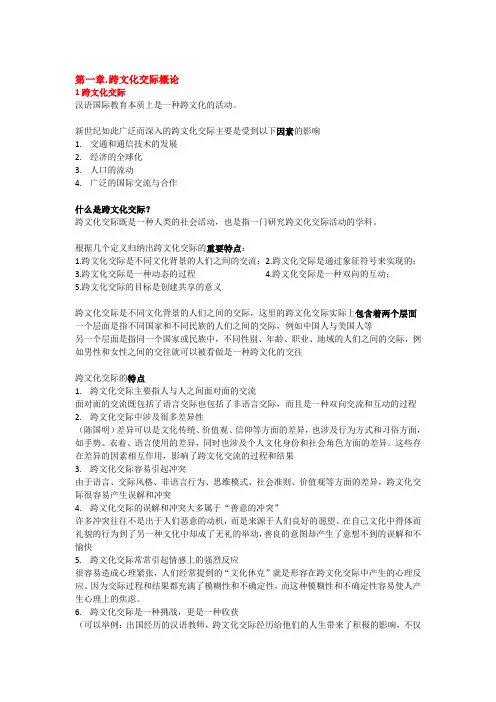
第一章.跨文化交际概论1跨文化交际汉语国际教育本质上是一种跨文化的活动。
新世纪如此广泛而深入的跨文化交际主要是受到以下因素的影响1.交通和通信技术的发展2.经济的全球化3.人口的流动4.广泛的国际交流与合作什么是跨文化交际?跨文化交际既是一种人类的社会活动,也是指一门研究跨文化交际活动的学科。
根据几个定义归纳出跨文化交际的重要特点:1.跨文化交际是不同文化背景的人们之间的交流;2.跨文化交际是通过象征符号来实现的;3.跨文化交际是一种动态的过程4.跨文化交际是一种双向的互动;5.跨文化交际的目标是创建共享的意义跨文化交际是不同文化背景的人们之间的交际,这里的跨文化交际实际上包含着两个层面一个层面是指不同国家和不同民族的人们之间的交际,例如中国人与美国人等另一个层面是指同一个国家或民族中,不同性别、年龄、职业、地域的人们之间的交际,例如男性和女性之间的交往就可以被看做是一种跨文化的交往跨文化交际的特点1.跨文化交际主要指人与人之间面对面的交流面对面的交流既包括了语言交际也包括了非语言交际,而且是一种双向交流和互动的过程2.跨文化交际中涉及很多差异性(陈国明)差异可以是文化传统、价值观、信仰等方面的差异,也涉及行为方式和习俗方面,如手势、衣着、语言使用的差异,同时也涉及个人文化身份和社会角色方面的差异。
这些存在差异的因素相互作用,影响了跨文化交流的过程和结果3.跨文化交际容易引起冲突由于语言、交际风格、非语言行为、思维模式、社会准则、价值观等方面的差异,跨文化交际很容易产生误解和冲突4.跨文化交际的误解和冲突大多属于“善意的冲突”许多冲突往往不是出于人们恶意的动机,而是来源于人们良好的愿望。
在自己文化中得体而礼貌的行为到了另一种文化中却成了无礼的举动,善良的意图却产生了意想不到的误解和不愉快5.跨文化交际常常引起情感上的强烈反应很容易造成心理紧张,人们经常提到的“文化休克”就是形容在跨文化交际中产生的心理反应。
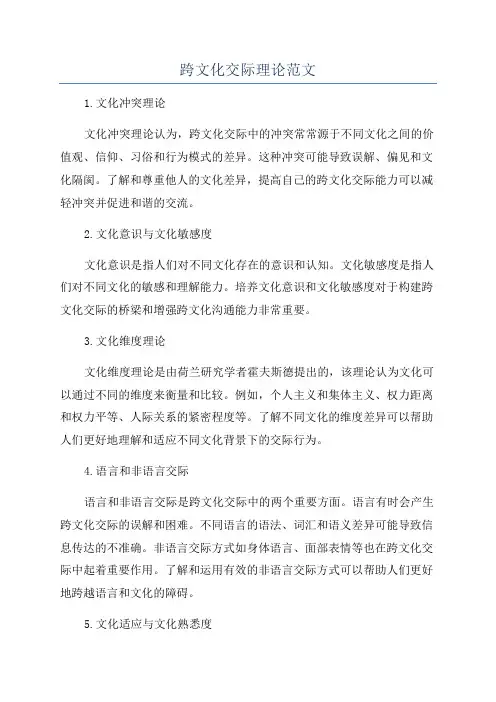
跨文化交际理论范文1.文化冲突理论文化冲突理论认为,跨文化交际中的冲突常常源于不同文化之间的价值观、信仰、习俗和行为模式的差异。
这种冲突可能导致误解、偏见和文化隔阂。
了解和尊重他人的文化差异,提高自己的跨文化交际能力可以减轻冲突并促进和谐的交流。
2.文化意识与文化敏感度文化意识是指人们对不同文化存在的意识和认知。
文化敏感度是指人们对不同文化的敏感和理解能力。
培养文化意识和文化敏感度对于构建跨文化交际的桥梁和增强跨文化沟通能力非常重要。
3.文化维度理论文化维度理论是由荷兰研究学者霍夫斯德提出的,该理论认为文化可以通过不同的维度来衡量和比较。
例如,个人主义和集体主义、权力距离和权力平等、人际关系的紧密程度等。
了解不同文化的维度差异可以帮助人们更好地理解和适应不同文化背景下的交际行为。
4.语言和非语言交际语言和非语言交际是跨文化交际中的两个重要方面。
语言有时会产生跨文化交际的误解和困难。
不同语言的语法、词汇和语义差异可能导致信息传达的不准确。
非语言交际方式如身体语言、面部表情等也在跨文化交际中起着重要作用。
了解和运用有效的非语言交际方式可以帮助人们更好地跨越语言和文化的障碍。
5.文化适应与文化熟悉度文化适应是指个人在跨文化环境中适应并融入本地文化的能力。
文化熟悉度是指个人对于不同文化的了解程度。
文化适应和文化熟悉度的提高可以帮助人们更好地适应和理解不同文化的行为规范、价值观和社会习俗。
6.跨文化沟通的策略与技巧跨文化沟通的策略与技巧是帮助人们在跨文化交际中更有效地传达和理解信息的方法和技术。
例如,倾听和观察能力的培养、适应性的沟通方式、尊重和理解他人的文化差异等。
通过运用这些策略和技巧,人们可以更好地建立积极、有效的跨文化交际关系。
综上所述,跨文化交际理论提供了一系列的概念和研究成果,旨在帮助人们更好地理解和应对不同文化之间的交流和相互理解问题。
这些理论和研究成果在实际应用中有助于提高跨文化交际的能力,并促进跨文化协调与合作。
跨⽂化交际论⽂关于跨⽂化交际论⽂ 论⽂常⽤来指进⾏各个学术领域的研究和描述学术研究成果的⽂章,简称之为论⽂。
它既是探讨问题进⾏学术研究的⼀种⼿段,⼜是描述学术研究成果进⾏学术交流的⼀种⼯具。
它包括学年论⽂、毕业论⽂、学位论⽂、科技论⽂、成果论⽂等。
下⾯是⼩编精⼼整理的关于跨⽂化交际论⽂,欢迎⼤家分享。
跨⽂化交际论⽂篇1 【摘要】 在全球经济⼀体化发展的背景下,跨⽂化交际逐渐的呈现出全球化趋势。
在跨⽂化交际中,不同的国家及民族之间价值所体现的差异性很容易给双⽅交流带来障碍,为此,对这种差异性进⾏研究,有助于不同⽂化背景的⼈在跨⽂化交际中避免或减少误解和冲突,本⽂以中美价值观为例,对这两种价值观产⽣的⽂化差异进⾏对⽐分析,以利于更好的了解中美价值观,促进中美跨⽂化交际。
【关键词】 跨⽂化交际的论⽂ ⼀、引⾔ 随着我国经济等诸多⽅⾯的⽇益强⼤及全球⼀体化经济的发展,与其他国家之间的交流和联系也越来越密切,但由于不同的国家和不同的民族有着各⾃不同的⽂化背景和价值观,当进⾏跨⽂化交际活动时,中美两国作为东西⽅⽂化代表,常常会出现交际阻碍和⽂化冲突。
最直接的⽅式是介绍两国的⽂化差异和⽂化习俗。
但⾃Cluc khohn(1961)等⼈提出了“价值标准”的概念之后,⼈们逐渐的开始认识到了解中美两国之间的⽂化差异仍然⽆法避免跨⽂化交际障碍。
庄恩平(1997)提出将了解双⽅的价值观作为促进跨⽂化交际顺利开展的主要因素。
为此,⽬前的形势需要我们关注西⽅⽂化价值观同时,也应该对⽐的对我国的⽂化价值观进⾏了解和研究,这也是成功进⾏跨⽂化交际的有效⽅式。
⼆、跨⽂化交际视阈下中美价值观的对⽐分析 Hofstede(1980)认为“价值观是跨⽂化交际的核⼼,⽀配并且决定着⼈们的态度、信念及⾏为。
”跨⽂化交际是各国经济、政治等诸多⽅⾯发展的共同需要,其复杂性来源各国⽂化的差异性、多样性和多元性。
⽂化决定了每个国家的价值观,⽽价值观⼜是道德的基础。
跨文化交际综合测从下列各题备选答案中选出一个正确答 2 分,共70 分)1. What does “ Australians have different perspectives to Chinese mean?单选题(共35题,共70分))( 2 分)A. they have different ways of talkingB. they have different ways of thinkingC. they have different ways of drinkingD. they have different ways of eating☆考生答案:B★考生得分: 2 分评语:2. As a man with plenty of guts, he is the person who is expected to bring success to this company which is on the verge of bankruptcy. The underlined part can be replaced by . ()(2 分)A. the white hopeB. the red hopeC. the green hopeD. the pink hope☆考生答案:A★考生得分: 2 分评语:3. In China, who will make the decisions for children? (分)A. MotherB. FatherC. GrandfatherD. Children☆考生答案:B★考生得分: 2 分评语:4. Married foreigners in China understand invitations to banquets by Chinese to mean ______ . ()( 2 分)A. they will get drunkB. their spouse is also invitedC. their spouse is not invitedD. they have to pay for dinner☆考生答案:B★考生得分: 2 分评语:5. Today, many Chinese people ______ . ()(2 分)A. pay a lot of attention to origins of surnamesB. are very aware of the meaning of given namesC. are mostly unaware of the meaning of given namesD. search for the origins of surnames☆考生答案:B★考生得分: 2 分评语:6. What is a sinologist? )(2 分)A. a specialist in languagesB. a student of Chinese languages.C. a specialist in Chinese studiesD. a Chinese language student☆考生答案:C★考生得分: 2 分评语:7. What is the primary relationship in a Chinese family? ()(2 分)A. husband-and-wife relationshipB. parent-and-children relationshipC. brother-and sisterD. grandparent-grandchildren☆考生答案:B★考生得分: 2 分评语:8. Which of the following is not a pair of synonyms? ()( 2 分)A. everlasting - never-endingB. autumn - winterC. youths - youngstersD. autumn - fall9. An “ utterance meaning ” is ______ . ()(2分)A. what a speaker saysB. what is heard by someoneC. what is meant by someoneD. how someone says something☆考生答案:A★考生得分: 2 分评语:10. A commonly held stereotype of the French is that they are ______ .()( 2 分) A. extremely rudeB. philosophicalC. extremely romanticD. cold and reserved☆考生答案:C★考生得分: 2 分评语:11. Such phrases such as:You should; You must; Do this; Don't do ____________ ()( 2 分)A. usually help cultural communicationB. sometimes help cultural communicationC. sometimes hinder cultural communicationD. potentially inhibit cultural communication2 分)12. Pick out the pair of words that are examples of American English?( ) ( 2 分) A. janitor, elevatorB. apartment, footpathC. post, gasD. nappies, trousers☆考生答案: A★考生得分: 2 分 评语:13. A Christian name is also called a ______ . ( ) A. given name B. surname C. family name D. last name☆考生答案: A★考生得分: 2 分 评语:14. The broad sense of “ social interaction ” is ___________ . ((2 分)A. relationships between peopleB. making friends easilyC. forming a social clubD. speaking to peopleproverbs.15. _____ is often regarded as the source of English()( 2 分)A. JeffersonB. WordsworthC. ShakespeareD. Hemingway☆考生答案:C★考生得分: 2 分评语:16. A “ white lie ” is _________ . ()(2 分)A. a lie told with the intention of causing troubleB. the intention to lie and not be caughtC. a good lie told with bad intentionsD. a lie told with good intentions☆考生答案:D★考生得分: 2 分评语:17. I'm afraid something bad may happen. We need to prepare for the worst. The underlined part can be replaced by ______________________ . (分)A. I've seen the red light.B. I've seen the green light.C. I've seen the yellow light.thesewithwithD. I've seen the orange light. ☆考生答案: A★考生得分: 2 分 评语:18.English is a language particularly rich in synonyms and synonyms differ from one another in the following ways except ___________________ .( ) ( 2 分)A. regional varietyB. stylistic differencesC. emotional connotations of wordsD. physical variety☆考生答案: D★考生得分: 2 分 评语:19. Scanning is a type of fast reading which is used ______________ . ((2 分)A. when the reader wants to locate a particular piece of information without necessarily understanding the rest of the text or passageB. when the reader wants to locate a particular piece of information totally understanding the rest text or passageC. when the reader wants to get the main ideaD. when the reader wants to locate a particular piece of information partialunderstanding of the rest of the text or passagebut 20. What is an idiom? ( ) (2 分)A. a phrase with a variety of meaningsB. a fixed phrase with its own meaningC. a meaningless phraseD. a phrase with limited meaning☆考生答案: B★考生得分: 2 分 评语:21. When will British people may sound cold and distant? ((2 分)A. when they really get bad weatherB. when they really are very upsetC. when they really are very friendlyD. when they really want to go home☆考生答案: C★考生得分: 2 分 评语:22. The reason why English and Chinese idioms are sometimes similar can differ is . ( ) ( 2 分)A. cultural traditionsB. religious beliefsC. historic circumstancescommunicating with ( 2 分)) ( 2 分)☆考生答案: D★考生得分: 2 分 评语:23. When two people coming from the same culture are each other, we can say this is a _________ . ( ) A. multi-cultural communicationB. bi-cultural communicationC. mono-cultural communicationD. cultural communication☆考生答案: C★考生得分: 2 分 评语:24. Women are believed to speak and hear __________ . (A. a language of connection and intimacyB. a language of intimacy and reflectionC. a language of connection and reflectionD. a language of connection, reflection and intimacy ☆考生答案:A ★考生得分: 2 分 评语:25. In “ western ” countries, hugging and kissing will be ( )(2 分) A. rarely seen in publicB. often seen in publicC. never seen in publicD. not allowed in public☆考生答案:B★考生得分: 2 分评语:26. All of the following is a necessary factor of communication except . ()(2 分)A. there is only one peopleB. there must be some contact between communicatorsC. there must be a language shared by communicatorsD. an exchange of information has taken place☆考生答案:A★考生得分: 2 分评语:27. One can assume from Margaret Thatcher ' s family name that herancestors _______ . ()( 2 分)A. sold candlesB. made clothesC. made barrelsD. made roofs☆考生答案:D★考生得分: 2 分评语:28. For Chinese children, married life sometimes begins with a shock because . ()( 2 分)A. they have to clean and cookB. they have to have a babyC. they have to live with someone elseD. they have to wash dishes☆考生答案:A★考生得分: 2 分评语:29. The term “ manin the street ” means ________ . ()(2 分)A. the man walking pastB. the person walking pastC. casual peopleD. ordinary people☆考生答案:D★考生得分: 2 分评语:30. A typical “ Western ” style meetings __________ . ()(2分)A. always start with prayersB. are always informal and friendlyC. lack any formal organizational structureD. usually are organized well in advance☆考生答案:D★考生得分: 2 分评语:31. If someone is “ stand-offish ” they are _____ . ()(2 分)A. IntimateB. StandingC. ReservedD. Outstanding☆考生答案:C★考生得分: 2 分评语:32. The following explanations are about the four basic parts of the computer, which of the following is incorrect? ()(2 分)A. You feed information into the computer with an input unit, such as a 答案board.B. The processing unit performs a task and then shows you the result on an output unit, such as a mouse.C. The memory unit stores information and instructions.D. The processing unit performs a task and then shows you the result on an output unit, such as a screen.☆考生答案:B★考生得分: 2 分评语:33. “Look like the innocent flower, but be the serpent under it ” isa saying from Shakespeare which implies that _____________ . ()( 2分)A. people can put on different gestures to hide their true feelingsB. people can say untrue words to hide their true feelingsC. people can put on different facial expressions to hide their true feelingsD. people can say wrong words to hide their true feelings☆考生答案:C★考生得分: 2 分评语:34. English is said to be a language of _____ in that many differentwords stand for the same thing. ()( 2 分)A. empathyB. sympathyC. synonymsD. antonyms☆考生答案:C★考生得分: 2 分评语:35. At English dinners hosts often inquire the guests ' favors _______________ ()( 2 分) A. just before they serve a mealB. before they come to the dinnerC. as they are serving the mealD. is a totally untrue statement☆考生答案:B★考生得分: 2 分评语:二. 判断题(共20题,共30分)从下列各题备选答案中选出多个正确答案,并将其代号写在题干前面的括号内每题 1. 5 分,共30 分)1. When you complain to your instructor about your course credits through telephone, you use two languages: natural language used between you and your instructor and artificial language used by the telephone()( 1. 5 分)☆考生答案:正确★考生得分: 1. 5 分评语:2. Certain animals are often associated with certain qualities in English and Chinese cultures. Some animals have similar associationsin both cultures: deer, for example, are regarded as dangerous and horrible. ()(1.5 分)☆考生答案:错误★考生得分: 1. 5 分评语:3. People from America and Britain speak different varieties of English, they usually find difficulty in understanding each other. ()(1. 5 分)☆考生答案:错误★考生得分: 1. 5 分评语:4. In individualist cultures, children are brought up to draw attentionto themselves. ()( 1. 5 分)☆考生答案:正确5. To be 'full of pep' is to be inactive and short of energy. ((1. 5 分)☆考生答案:错误★考生得分: 1. 5 分评语:6. When we Chinese suggests going for a meal at a restaurant, the person whoinvites should pay; this is always true in English- speaking countries. ()( 1. 5 分)☆考生答案:错误★考生得分: 1. 5 分评语:7. The Chinese are affectionate to their friends and relatives, but perhaps they show their affection in public less than other peoples.()( 1. 5 分)☆考生答案:正确★考生得分: 1. 5 分评语:8. We express our emotions not only verbally but also through non-verbal channels, and one of the main non-verbal channels is facial expression.()( 1. 5 分)☆考生答案:正确★考生得分: 1. 5 分评语:9. Western culture asks people to behave very modestly when paying avisit to someone. Nevertheless, when they decline the host ' s offer they hope the host would ask again or bring out a cup of coffee or a mug of☆考生答案:错误★考生得分: 1. 5 分评语:10. Guests invited to dinner in the West frequently bring only one bottle of wine, bringing two might even give the impression that the giver is a heavy drinker. ()( 1. 5 分)☆考生答案:正确★考生得分: 1. 5 分评语:11. People are sensitive about their personal appearance. So evenif something appears to you to be wrong, it's not polite to mention itunless you know the person very well. ()( 1. 5 分)☆考生答案:正确★考生得分: 1. 5 分评语:12. In face-to-face communication non-verbal signals are not important at all. ()(1. 5 分)☆考生答案:错误★考生得分: 1. 5 分评语:13. After the westerners say 'no', they usually wait for the second orthird offer before they accept it, but that never happens in a Chinese home. ()( 1. 5 分)☆考生答案:错误) ( 1. 14. Machine language is known as artificial language. (5 分)☆考生答案:正确★考生得分: 1. 5 分评语:15. A social situation may receive two definitions. One is given bythe community, and the other by the participants. ()( 1. 5分)☆考生答案:正确★考生得分: 1. 5 分评语:16. “Snack” and “ baggin ” provide an example to show the difference in stylistic variety. ()(1. 5 分)☆考生答案:错误★考生得分: 1. 5 分评语:17. A written message does not create an instance of communication until the message receiver reads it. ()( 1. 5 分)☆考生答案:正确★考生得分: 1. 5 分评语:18. Nowadays, however, all people no longer pay much attention to the origin of their surnames, and they are much more aware of the meaning of their given names. ()( 1. 5 分)☆考生答案:错误19. Telegraphy marked a great advance in rapid long-distance communication; early telegraph systems could convey messages passage by passage. ()(1. 5 分)☆考生答案:错误★考生得分: 1. 5 分评语:20. A person who has 'cheek' is afraid of doing things that annoy orembarrass people. ()(1. 5 分)☆考生答案:错误★考生得分: 1. 5 分评语:。
中西方跨文化交际的案例一、饮食文化方面。
1. 火锅与西餐。
我有个中国朋友小明去国外留学,在学校里交了个美国朋友杰克。
有一次,小明热情地邀请杰克去吃中国火锅。
杰克一进火锅店就被那热闹的氛围搞懵了。
当服务员端上锅底,各种生的食材,像毛肚、鸭肠、肥牛卷之类的,杰克瞪大了眼睛。
他平时吃西餐,牛排啥的都是煎得好好的端上来。
小明不停地把食材往锅里涮,还热情地给杰克夹菜,说:“这个毛肚啊,七上八下就可以吃了,可嫩了。
”杰克看着那在锅里翻腾的毛肚,犹豫了好久才放进嘴里,然后被那独特的口感惊到了。
而杰克呢,后来回请小明去吃西餐。
小明看着那一小份一小份精致摆盘的食物,心想这哪够吃啊。
他拿起刀叉,感觉特别别扭,不像用筷子那么顺手,还不小心把牛排切得满盘子都是汁水,两个人看着彼此的窘态都哈哈大笑起来。
2. 茶文化与咖啡文化。
有个中国的商务代表团去英国谈合作。
谈判休息期间,英国方面的负责人请中国客人喝咖啡。
对于英国人来说,咖啡是日常社交饮品,他们优雅地拿着咖啡杯,小抿一口,谈论着咖啡的产地和风味。
而中国代表团里有个刘先生,他是个老茶客,平时就爱喝茶。
他看着那一小杯咖啡,心里嘀咕着“这哪有茶喝着舒坦”。
于是他就从包里拿出一小包自己带的茶叶,问英国人有没有热水可以泡茶。
英国人一脸惊讶,他们没想到中国人这么爱喝茶,在他们的概念里,咖啡才是正式的社交饮品。
刘先生就开始给英国人介绍中国的茶文化,从茶叶的种类到泡茶的讲究,什么“春茶最香,不同的茶要用不同的水温泡”之类的。
英国人听着觉得特别新奇,这就像他们对不同咖啡豆烘焙程度的讲究一样,双方因为饮品文化的交流,关系也变得更加融洽了。
二、社交礼仪方面。
1. 见面礼仪。
我的同事小赵去法国出差。
在一个商务会议上,他遇到了很多法国的合作伙伴。
小赵习惯了中国人见面握手的方式,所以他见到法国同事的时候就热情地伸出手去握手。
可是有些法国女士,按照法国的礼仪习惯,是行贴面礼的。
这就有点尴尬了,有个法国女同事愣了一下,然后笑着先和小赵握了手,然后又侧过脸来轻轻贴了一下,还开玩笑地说:“你这个中国的热情握手和我们法国的贴面礼结合得很特别呢。
第1篇一、前言随着全球化进程的不断深入,跨文化交际已成为国际交流与合作中不可或缺的一部分。
在我国,随着“一带一路”倡议的推进,跨文化交际的重要性日益凸显。
本年度,我部门承担了多项跨文化交际任务,现将工作总结如下。
二、工作概述(一)跨文化培训1. 培训对象:针对公司内部员工、合作伙伴及客户,开展了多场跨文化培训。
2. 培训内容:主要包括文化差异、沟通技巧、礼仪规范、跨文化谈判等。
3. 培训形式:采用讲座、案例分享、角色扮演、互动讨论等多种形式。
4. 培训成果:员工对跨文化交际有了更深入的了解,沟通能力得到提升,跨文化交际效果显著。
(二)跨文化沟通1. 沟通渠道:通过邮件、电话、视频会议等多种渠道与国外合作伙伴、客户进行沟通。
2. 沟通内容:涉及业务合作、市场推广、项目执行等方面。
3. 沟通技巧:注重尊重对方文化,运用适当的沟通策略,确保信息准确传达。
4. 沟通成果:成功完成了多个国际合作项目,提升了公司在国际市场的竞争力。
(三)跨文化谈判1. 谈判对象:与国外合作伙伴、客户进行商务谈判。
2. 谈判内容:涉及合同条款、价格谈判、合作模式等。
3. 谈判策略:充分了解对方文化背景,运用灵活的谈判技巧,达成双方满意的协议。
4. 谈判成果:成功签订了多项合作协议,为公司创造了良好的经济效益。
三、工作经验与体会(一)充分了解文化差异1. 研究文化背景:深入了解对方国家的文化、习俗、价值观等。
2. 尊重文化差异:在沟通和谈判中,尊重对方的文化习惯,避免文化冲突。
(二)掌握沟通技巧1. 语言表达:运用简洁、清晰的语言,确保信息准确传达。
2. 非语言沟通:注意肢体语言、面部表情等非语言沟通方式,避免误解。
3. 倾听技巧:认真倾听对方意见,充分表达自己的观点。
(三)灵活运用谈判策略1. 了解对方需求:充分了解对方利益诉求,寻找共同点。
2. 运用谈判技巧:灵活运用让步、妥协等策略,达成双方满意的协议。
四、存在问题与改进措施(一)问题1. 部分员工对跨文化交际的认识不足,沟通能力有待提高。
跨文化交际的心得体会英文Cross-cultural communication is a crucial aspect of our increasingly interconnected world. As I have embarked on various cross-cultural experiences throughout my life, I have gained valuable insights and developed a deeper understanding of the complexities and nuances involved in effectively communicating across cultures.One of the most important lessons I have learned is the importance of cultural sensitivity and awareness. Every culture has its own unique values, beliefs, and norms, and it is essential to be respectful and open-minded when interacting with individuals from different backgrounds. This includes being mindful of nonverbal cues, such as body language and gesture, which can vary significantly from one culture to another. For example, while making direct eye contact is considered a sign of respect in some cultures, it may be seen as intrusive or confrontational in others. By being aware of these nuances, we can avoid misunderstandings and build stronger connections with people from different cultures. In addition, language plays a pivotal role in cross-cultural communication. As someone who has learned multiple languages, I have come to appreciate the power of language in shaping our understanding of the world and our relationships with others. Learning a foreign language not only allows us to effectively communicate with people from different cultures, but it also provides us with a deeper insight into their mindset and worldview. For example, the concept of "face" in Chinese culture is crucial to understanding their communication style, which emphasizes harmony and avoiding confrontation. By learning about theselinguistic and cultural nuances, we can adapt our communication style to create a more inclusive and respectful dialogue.Another key aspect of cross-cultural communication is the ability to embrace diversity and be open to different perspectives. It is natural for individuals to be influenced by their own cultural biases and assumptions, but being able to recognize and challenge these biases is essential for effective communication. Through my cross-cultural experiences, I have learned the value of suspending judgment and approaching every interaction with an open mind. By listening attentively and seeking to understand the other person's point of view, we can bridge cultural gaps and foster meaningful connections.Furthermore, building trust and rapport is essential in cross-cultural communication. Trust forms the foundation of any successful relationship, and it is particularly crucial when communicating across cultures where there may be language barriers, different communication styles, or historical conflicts. Trust can be developed through active listening, showing empathy, and demonstrating a genuine interest in the other person's culture. By investing time and effort in getting to know others and building authentic connections, we can establish a solid trust base that enables effective cross-cultural communication.Lastly, I have learned that cross-cultural communication is a continuous learning process. No matter how much we think we know about a particular culture, there will always be new discoveries and insights to be gained. As the world becomes more globalized, the need for cross-cultural understanding andcommunication will only increase. Therefore, it is essential to approach every cross-cultural interaction with a sense of curiosity and humility, recognizing that cultural dynamics are constantly evolving and that there is always more to learn.In conclusion, my experiences in cross-cultural communication have taught me the importance of cultural sensitivity, language proficiency, open-mindedness, building trust, and continuous learning. By embracing these principles, I believe we can bridge cultural gaps, foster understanding, and create a more harmonious and inclusive world.。
霍夫斯太德衡量文化差异的五个维度Individualism (IDV) focuses on the degree the society reinforces individual or collective achievement and interpersonal relationships. A High Individualism ranking indicates that individuality and individual rights are paramount within the society. Individuals in these societies may tend to form a larger number of looser relationships. A Low Individualism ranking typifies societies of a more collectivist nature with close ties between individuals. These cultures reinforce extended families and collectives where everyone takes responsibility for fellow members of their group.个人主义——Individualism (IDV)聚焦于社会对于个人成就及人际关系的认同程度。
高个人主义强调个性及个人权利在一个社会中是头等重要的。
倾向于建立一种松散的组织关系架构。
低个人主义(集体主义)文化指组织更强调个体之间紧密的联系。
这些文化强调家庭式的观念和情感依赖以及成员对于组织中其他成员的责任感。
Power Distance Index (PDI) focuses on the degree of equality, or inequality, between people in the country's society. A High Power Distance ranking indicates that inequalities of power and wealth have been allowed to grow within the society. These societies are more likely to follow a caste system that does not allow significant upward mobility of its citizens. A Low Power Distance ranking indicates the society de-emphasizes the differences between citizen's power and wealth. In these societies equality and opportunity for everyone is stressed.权利距离指数——Power Distance Index (PDI)聚焦于不同国家人与人之间的平等程度。